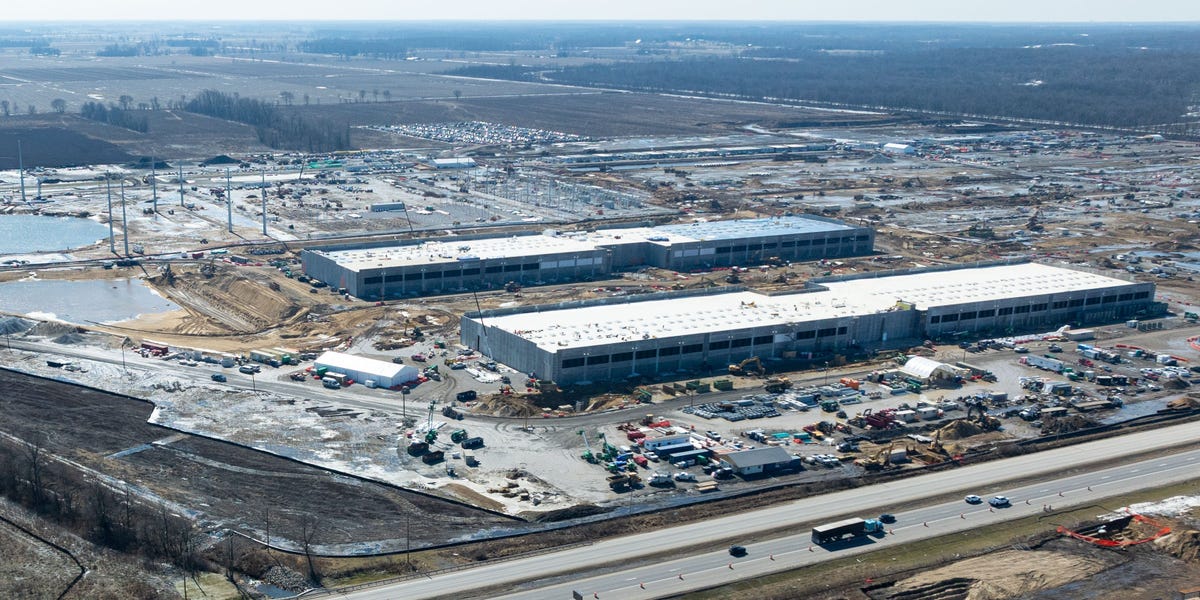
Take a look at our newest merchandise
- Indiana’s knowledge middle growth requires much more energy, and it dangers saddling prospects with the fee.
- State lawmakers are contemplating a invoice to place tech firms on the hook for 80% of mission prices.
- Knowledge facilities may have extra energy than all of Indiana’s 7 million residents mixed.
When President Donald Trump in January introduced a cope with a billionaire in Dubai to construct knowledge facilities throughout the US, it instantly raised alarm bells in Indiana.
Trump mentioned the state and 7 others have been a part of the primary part of the $20 billion international funding plan. It might add to Indiana’s rising fleet of knowledge facilities beneath building by firms together with Amazon, Microsoft, and Google, which want large quantities of computing energy for the synthetic intelligence growth. The expansion dangers saddling residents with tons of of hundreds of thousands of {dollars} in further prices via increased power payments.
The state of affairs has set off a debate in Indiana over who ought to foot the invoice for the brand new energy crops and transmission infrastructure wanted to serve knowledge facilities. A invoice shifting via the Indiana legislature would require tech corporations like Amazon, Microsoft, and Google to cowl 80% of mission prices, which, if enacted, would make it the primary state to take action. On the identical time, the invoice would permit Indiana utilities to attempt to move the prices of constructing smaller nuclear reactors to prospects. Tech firms hope these early-stage power options might sometime provide cleaner, around-the-clock energy to knowledge facilities.
It is a blended bag for Indiana residents that shopper advocacy teams oppose, and underscores a dilemma many states throughout the nation are confronting: learn how to maintain tech corporations accountable for his or her power-hungry knowledge facilities and their guarantees that AI shall be powered by inexperienced power. Up to now, fossil fuels like pure fuel and coal crops are anticipated to fulfill the demand.
“If firms wish to construct an information middle right here, and now we have to construct new energy technology for them, then they should share in that threat,” Indiana Rep. Ed Soliday, a Republican who authored the invoice, informed Enterprise Insider. “There are a few knowledge middle people which have mentioned, ‘Oh no, that is not honest.’ Sure, it’s. Grandma down the road should not should pay to your goals.”
Indiana courts power-hungry knowledge facilities
Whereas Indiana would not high the listing of main US knowledge middle hubs, the Rust Belt state is rising as one other participant for a lot of causes. Indiana has a dependable energy provide from coal and pure fuel and might draw electrical energy from two regional grids. That state has a low threat of pure disasters that might disrupt that offer. Indiana lawmakers in 2019 exempted knowledge middle gear and power use from gross sales taxes. Land can also be cheaper than different components of the nation.
These perks have attracted massive knowledge facilities to northern Indiana. Final 12 months, Amazon Internet Companies began building on an $11 billion knowledge middle campus in New Carlisle. Google introduced plans to construct a $2 billion knowledge middle in Fort Wayne. Microsoft is planning a $1 billion knowledge middle in LaPorte; Meta is investing $800 million in a campus in southern Indiana that might function by 2026.
Tasks within the pipeline might devour extra electrical energy than the almost 7 million residents in Indiana mixed by 2035, in accordance with forecasts by state utilities analyzed by the Residents Motion Coalition of Indiana, an advocacy group that opposes knowledge middle growth within the state.
The coalition has referred to as for a moratorium on new knowledge facilities till state leaders can examine their potential affect on the electrical grid and utility payments. However as extra tasks enter the pipeline with help from state officers, the coalition final 12 months intervened in negotiations between a utility and the information middle business — together with Amazon Internet Companies, Google, and Microsoft — geared toward making certain the businesses pay a justifiable share for his or her power use and related energy grid infrastructure upgrades. The events in November reached an settlement geared toward shielding Indiana prospects from a number of the further prices by requiring massive knowledge facilities every month to pay no less than 80% of their contracted electrical energy use, even when they do not use it. New transmission infrastructure and energy technology to serve knowledge facilities might price as much as $1 billion, the settlement mentioned.
Indiana regulators accredited the settlement in February. The utility, Indiana Michigan Energy, initiated the adjustments to what its massive industrial power customers pay after forecasting that knowledge facilities might enhance peak electrical energy demand by 150% by 2030, to greater than 7,000 megawatts. That is equal to energy for about 4.6 million residents within the state or two-thirds of Indiana’s total inhabitants. And that is only one utility’s service space. The Northern Indiana Public Service Firm’s newest forecast reveals knowledge facilities might double its power demand by 2035.
Andrew Williamson, Indiana Michigan Energy’s listing of regulatory companies, mentioned in written testimony that the magnitude of demand for electrical energy was unprecedented and in contrast to any earlier power load additions the utility had ever skilled.
‘Extra hurt than good’
Reasonably than hanging offers utility by utility, shopper advocates mentioned a statewide legislation might higher defend Indiana residents from rising power payments related to new knowledge facilities.
However the invoice shifting via the state legislature falls quick, mentioned Ben Inskeep, program director of the Residents Motion Coalition of Indiana. He mentioned the invoice accommodates a loophole, in that it would not cowl particular contracts utilities can negotiate with knowledge facilities for electrical energy charges. The invoice additionally would create an expedited course of for approving new energy technology by a utility that desires to attach massive power hundreds like an information middle, which Inskeep nervous would not permit sufficient time for public enter. The coalition additionally desires lawmakers to remove provisions permitting utilities to hunt permission from state regulators to get better as much as 100% of the prices of constructing small nuclear reactors from prospects.
“We want state policymakers to be enthusiastic about these points in a complete means,” Inskeep mentioned. “However we wish to be sure what they do would not create extra hurt than good.”
Indiana Gov. Mike Braun informed Information 10 in February that he supported nuclear energy however that utilities ought to shoulder the prices.
“I am hesitant about placing that solely on the again of the ratepayers,” Braun mentioned, including that the utility firms should take up these prices via “capitalism.”
“They’re on the market as investor owned, and a few of that’s going to should be the danger that they take,” Braun mentioned.
The invoice handed the Home on February 13 and was referred to a Senate committee. The Indiana legislature is in session via April.
In the meantime, the information middle growth reveals no indicators of slowing in Indiana and throughout the US, together with from international buyers desperate to get a stake within the AI race.
Hussain Sajwani, an actual property tycoon dubbed the “Donald of Dubai,” has enterprise offers with Trump and Elon Musk. Whether or not Sajwani’s deliberate $20 billion funding in knowledge facilities is getting underway in Indiana is unclear, however for Inskeep, it wasn’t stunning.
“Oh, right here comes one other one,” Inskeep mentioned of his preliminary response. “At this second in time, we’re simply seeing so many knowledge facilities flood into Indiana that is a bit overwhelming. And it is actually exhausting to fathom the magnitude of the impacts.”
Google declined BI’s request to remark, Microsoft did not reply, and Amazon and the Knowledge Middle Coalition didn’t ship remark by the point of publication.
Do you’ve got a narrative to share? Contact this reporter at cboudreau@businessinsider.com.

![[Windows 11 Pro]HP 15 15.6″ FHD Business Laptop Computer, Quad Core Intel i5-1135G7 (Beats i7-1065G7), 16GB RAM, 512GB PCIe SSD, Numeric Keypad, Wi-Fi 6, Bluetooth 4.2, Type-C, Webcam, HDMI, w/Battery](https://m.media-amazon.com/images/I/71LYTzK2A8L._AC_SL1500_.jpg)



![[UPDATED 2.0] Phone mount and holder compatible with Samsung Z Fold 2 3 4 5 6 Pixel Fold or Foldable phone | bicycle, treadmill, handlebar, elliptical, stroller, rail, handle, roundbar, golf cart](https://m.media-amazon.com/images/I/51CjGlidGRL._SL1023_.jpg)








